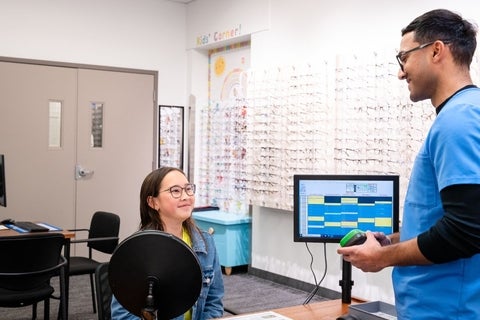
What is myopia?
Myopia, or nearsightedness, typically occurs if the eye grows too long and focuses images in front of the retina instead of on it. It can also occur if the cornea (clear dome at the front of the eye) is too curved. Either way, the result is blurry distance vision. Myopia generally starts in childhood and progresses (gets worse) until the child stops growing around age 18 to 21.
In some children, myopia can worsen fast. This is called progressive myopia. Left untreated, progressive myopia may increase the risk of conditions like glaucoma or retinal detachment later in life.
What causes myopia?
We are not totally sure why some children become myopic and others don't. We do know there is both a genetic component and an environmental component. Parents with myopia are likely to have children who are also myopic.
Other causes may be:
- Insufficient exposure to daylight
- Excessive up-close work
Increasing outdoor play and reducing close work may help prevent myopia. Once children develop myopia, however, myopia control treatment is needed to slow its progression.
What is myopia control treatment?
Slowing down the progression of myopia is the goal of myopia control treatment. While your child's prescription may continue to change, it will change at a slower rate. This means they will have a lower risk of developing sight-threatening eye conditions later in life that are associated with higher levels of myopia.
We use the most up-to-date evidence-based strategies to manage myopia progression. There are a variety of options available, all of which have similar levels of efficacy and which may have different pros and cons depending on your and your child’s lifestyle. These include:
- Specially designed soft contact lenses worn during the day.
- Specially designed glasses worn during the day.
- Rigid, gas-permeable lenses worn at night to reshape the cornea (front surface of the eye).
- Eye drops inserted at night – children using this method may also need to wear regular glasses or contact lenses during the day to correct their vision.
- A combination of two of the above approaches.
We track eye growth and prescription changes over time and can adjust treatment methods as needed.
Contact
Our Advanced Contact Lens Service, which provides myopia control treatment even if the method chosen doesn't involve contact lenses, is located at our Waterloo Clinic. To make an appointment, call: 519-888-4414.
Address: Unit C, 419 Phillip St., Waterloo